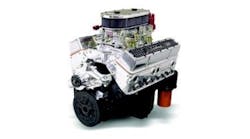50 years ago in American Machinist
AM editors reported in the October 24 issue that the National Security Council had shelved a plan for an 18-month mobilization buildup in case of war. Seems the government decided that the advent of nuclear weapons made another prolonged world war unlikely.
The Defense Department (DoD) put a crimp in the administration's plan for a balanced budget by adding $500 million to its $34.5 million budget proposal for fiscal 1956. The increased expenditure estimate, the editors noted, was not the result of new programs. However, the editors did report that the "elephant tool program," which the editors did not explain, had been "taken down off the shelf and once more readied for action." The plan had the blessings of the Office of Defense Mobilization.
...while changing things is sometimes good...
In August 1955, Hurricane Diane made landfall in North Carolina, just one week after Hurricane Connie hit the Mid-Atlantic states. The resulting flooding left over $800 million in damage (about $5 billion in today's dollars), including machinery plants in the Naugatuck Valley, Conn. In the wake of the floods, senators, including John F. Kennedy, proposed several flood insurance programs. As a result, Congress passed the Federal Flood Insurance Act of 1956; and time, floods and congressional laws came and went until 1968, when Congress created the National Flood Insurance Program managed by the Federal Emergency Management Agency (FEMA).
...yet change can be disconcerting.
The Patman Subcommittee of the Joint Committee of the Economic Report was toSince the Great Depression, the debate over technology and unemployment waxed and waned. In the 1930s, when unemployment was out of control, the debate raged, but during World War II, when there was full employment, it waned, then, in the prosperous 1950s and early 1960s, the debate, stimulated by early computerization and other forms of electronic replication, waxed. The problem, as viewed by Reuther and other labor leaders, was that unemployment lingered amidst otherwise bright economic prospects. As if foretold by Congressional hearings in 1955, the fear of employee redundancy and the promise of a new consumerist economy went hand-in-hand into the future and were transformed into a new idiom by the computer revolution of the 1970s and 1980s.

